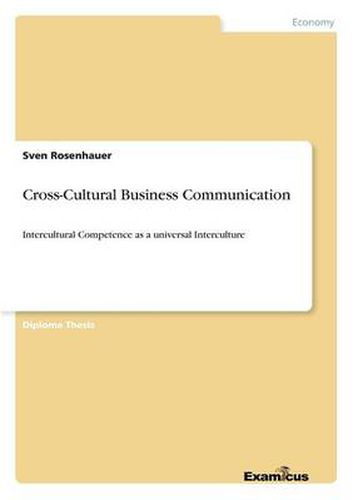Readings Newsletter
Become a Readings Member to make your shopping experience even easier.
Sign in or sign up for free!
You’re not far away from qualifying for FREE standard shipping within Australia
You’ve qualified for FREE standard shipping within Australia
The cart is loading…






This title is printed to order. This book may have been self-published. If so, we cannot guarantee the quality of the content. In the main most books will have gone through the editing process however some may not. We therefore suggest that you be aware of this before ordering this book. If in doubt check either the author or publisher’s details as we are unable to accept any returns unless they are faulty. Please contact us if you have any questions.
Diploma Thesis from the year 2007 in the subject Business economics - Offline Marketing and Online Marketing, grade: 1, Berlin School of Economics, language: English, abstract: The purpose of the present thesis is to examine if and to which extent cultures converge in an international business environment and if intercultural competence has a bearing on it. Therefore, theoretical and practical insights in the subject of culture, its implicit and explicit differences, as well as its measurements will be provided. Due to the fact that communication - as a major cultural attribute - is the most obvious level on which cultural differences are recognized, insights in the topic of cross-cultural and intercultural communication will be given. A thorough discussion of the concept of culture and communication is beyond the scope of this paper, but in what follows, an adequate overview of recognized and well-known researchers? theories and findings will be provided. Besides giving theoretical background knowledge, it will be examined whether the internationally defined soft skills of intercultural competence can be seen as an approach towards a universal interculture, likewise a universal communication. The topic of the present thesis will be illustrated by a case study, as well as researched and evaluated by a field study conducted at one of the most culturally diverse organization - the United Nations. Findings should only expose tendencies to confirm or disprove previous research findings in the field of cross-cultural comparative research and intercultural communication. It is not intended to present new empirical findings.
$9.00 standard shipping within Australia
FREE standard shipping within Australia for orders over $100.00
Express & International shipping calculated at checkout
This title is printed to order. This book may have been self-published. If so, we cannot guarantee the quality of the content. In the main most books will have gone through the editing process however some may not. We therefore suggest that you be aware of this before ordering this book. If in doubt check either the author or publisher’s details as we are unable to accept any returns unless they are faulty. Please contact us if you have any questions.
Diploma Thesis from the year 2007 in the subject Business economics - Offline Marketing and Online Marketing, grade: 1, Berlin School of Economics, language: English, abstract: The purpose of the present thesis is to examine if and to which extent cultures converge in an international business environment and if intercultural competence has a bearing on it. Therefore, theoretical and practical insights in the subject of culture, its implicit and explicit differences, as well as its measurements will be provided. Due to the fact that communication - as a major cultural attribute - is the most obvious level on which cultural differences are recognized, insights in the topic of cross-cultural and intercultural communication will be given. A thorough discussion of the concept of culture and communication is beyond the scope of this paper, but in what follows, an adequate overview of recognized and well-known researchers? theories and findings will be provided. Besides giving theoretical background knowledge, it will be examined whether the internationally defined soft skills of intercultural competence can be seen as an approach towards a universal interculture, likewise a universal communication. The topic of the present thesis will be illustrated by a case study, as well as researched and evaluated by a field study conducted at one of the most culturally diverse organization - the United Nations. Findings should only expose tendencies to confirm or disprove previous research findings in the field of cross-cultural comparative research and intercultural communication. It is not intended to present new empirical findings.